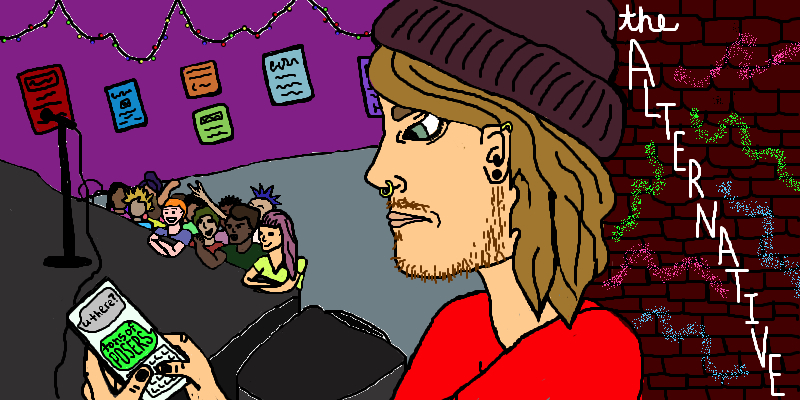Teen Fans: Overlooked and Undermined
Posted: by The Alt Editing Staff

Graphic: Julia Carbone
In fourth grade, I got in trouble at school for wearing a pair of netted fingerless gloves (you know, the ones that go halfway up your forearm). Apparently, they were against the dress code, but my sister had just burned me a copy of Take Off Your Pants and Jacket and I wanted to properly transform my aesthetic. I didn’t understand why my gloves were against the rules, and frankly was upset I couldn’t be my school’s next Avril Lavigne. How else were my peers going to know I was cool?
Fast-forward to middle school, when I got my first MP3 player. The only music I had available was what my sister had already saved on our computer. I ended up with a hodge-podge of the era’s emo hits and A Fever You Can’t Sweat Out in full. All the necessary materials to become my school’s scene queen.
Growing up in a small farm town, not many kids around me were passionate about music. Having a cool older sister definitely shaped my listening habits, but it wasn’t until my teen years that music became a huge part of my identity. I found joy in discovering new bands and sharing them with my friends. After awhile, it was the only part of my life that made sense, and the only thing that made me feel like I had a place in the world.
Eventually I traded in my fingerless gloves for “defend pop punk” crew necks, and I spent all of my time gushing about my favorite artists to anyone who would listen. Feeling as if these musicians were tracking my thoughts and writing songs specifically for me, I wore their t-shirts around school in hopes of finding others who felt the same. I had never been invested in anything like that before, and I wanted to scream off the rooftops to spread the word. From then on, everything in my life began to revolve around music.
Many of us have similar stories. However, as we grow older, if you’re like me, you grow a bit jaded. You get tired of going to shows, you have bigger responsibilities, and you start to develop different interests. Suddenly, you wake up and realize you’ve become the guy you made fun of who stands in the back with a PBR and a set of fancy earplugs.
With their unfettered passion to experience music in as many ways as possible, teen fans are what keep the industry running. Many musicians owe it to their younger fans to keep their careers afloat. To buy their tickets, to sport their merch, and to create their hype. In spite of this, teen fans are usually the most disenfranchised and/or overlooked. They’re not always taken seriously, and often feel unsafe at shows.
Within the past few years, an onslaught of abuse allegations have been brought to light against popular musicians using their influence in the scene to take advantage of younger fans. Overall, the community has gotten better at taking accountability of these situations, but there’s still a lot work to be done.
One glaring issue is that teen voices are rarely included in these conversations. Therefore, I reached out to a multitude of teens, aged 14-19, to get their insight on being belittled and/or feeling unsafe at shows. They all expressed similar concerns.
“I constantly worry about sexual assault at shows,” said 19-year-old Cady Cohen. “I have never myself been sexually assaulted—touched without consent, specifically—at shows, but plenty of my friends have and it’s frightening.”
Being a woman or identifying as a minority at a show is already hard enough. When you add being one of the youngest ones there to the mix, the feeling of unrest is intensified.
In addition to feeling unsafe, others felt as though younger fans are the most involved show attendees, but are also most likely to be considered “fake fans.”
“I get treated like a kid that doesn’t know real music,” said 18-year-old Jose Afonso. “Record shops think I’m just riding the newest trend, and people on Twitter automatically assume I’m trying to listen to exclusively Fall Out Boy and State Champs, or something.”
Women, especially, expressed their frustrations in feeling like they have to prove themselves as fans.
“I’ve seen Jimmy Eat World twice now, both times with my dad and older brother,” said 19-year-old Mallory Warrix. “At the show, I was the one who got questioned to see if I was a ‘real’ fan, never my brother or my dad… I feel like I have to be a ‘better’ fan just to be taken seriously.”

Graphic: Julia Carbone
This is the crux of the “fangirl” trope. Girls who like music are immediately taken less seriously, often made fun of, and are assumed to only like bands because they think the members are attractive.
“I think the most infuriating thing is people constantly thinking that because I like a band, I must like the band members as well” said Christina Fennell. “There have been so many times that I’ve talked to a band member after a show, because I want to make connections and tell them I appreciate their music, and people instantly assume I must want to sleep with them. It’s gross and upsetting. It’s trivializing and annoying. The worst part is my boyfriend always goes up to band members to talk about music and stuff and no one ever assumes it’s because he likes them. But if I do the same thing it’s because I must have a crush on them.”
Despite this, most teens I spoke to admitted to spending hundreds of dollars a year on average at shows. Factoring in ticket prices, travel expenses, and buying merch, it begins to add up. Almost every show ends in the purchase of a new shirt, sweater, record, poster, or some combination of whatever the band is offering that night. It’s a way for them to express themselves and to show their support for the artists.
“I definitely blow a fair amount of money on the bands I love,” said 16-year-old Sai Ariyanayagam. “I own a lot of merch, with some of my favorite articles of clothing being my Citizen and Sorority Noise long sleeves, and my Tigers Jaw hoodie. And my room is decked out all over with 25+ posters. I buy a lot of albums on Bandcamp because I use Spotify as my main source of music and I want to support them with more than just the streaming money.”
Not only are they often more into repping a band outside the concert setting, younger fans are typically more likely to get to a show early, pay for meet and greets, and be involved; staying up front and screaming every lyric. They’re the ones packing in venues and starting pits. Many teens felt as though older fans come to shows for a feeling of nostalgia or to see a specific band, leaving after they play or showing up late. Younger fans seem to be more open-minded to not only bands who change their sound, but to coming early to experience new ones.
Often times, older generations seem to lounge by the bar most of the night, leaving younger fans to pack the front. However, this brings up the concern of alcohol consumption. Many stated that more than once they’ve felt their safety compromised by someone who had drank too much. Afonso shared an experience in which he was mistreated by fans under the influence because of his race.
“In South Florida, my ethnicity isn’t much of an issue,” he said. “The one show I ever attended outside of SoFlo was a nightmare, though. Although usually I can manage my way to the barricade, I was getting purposefully thrown around by four or five middle-aged white dudes. They were clearly drunk but I was the only one getting thrown around. I made my way out of the pit and watched the whole show from a railing.”
No one should be treated like this, especially kids who are just trying to have a good time.
“If you’re at a show supporting the band that’s performing, don’t be afraid to boogie down and have a ball,” said 19-year-old Theo Bonilla. “But be safe and respectful to those around you as well.”
Regardless of all the negative experiences, everyone shared the same passion and believed that younger fans are, as they have been throughout the art form’s history as a pop culture phenomenon, the future of music. It’s clear to see that creating safer spaces is an ongoing feat, but teens need to be a part the conversation.
When you’re young, you’re constantly trying to figure yourself out, and for many, music is the one thing that makes sense. Fans shouldn’t be fearful of what they seek solace in.
—
Emily Kitchin | @deathnap4cutie
The Alternative is ad-free and 100% supported by our readers. If you’d like to help us produce more content and promote more great new music, please consider donating to our Patreon page, which also allows you to receive sweet perks like free albums and The Alternative merch.










